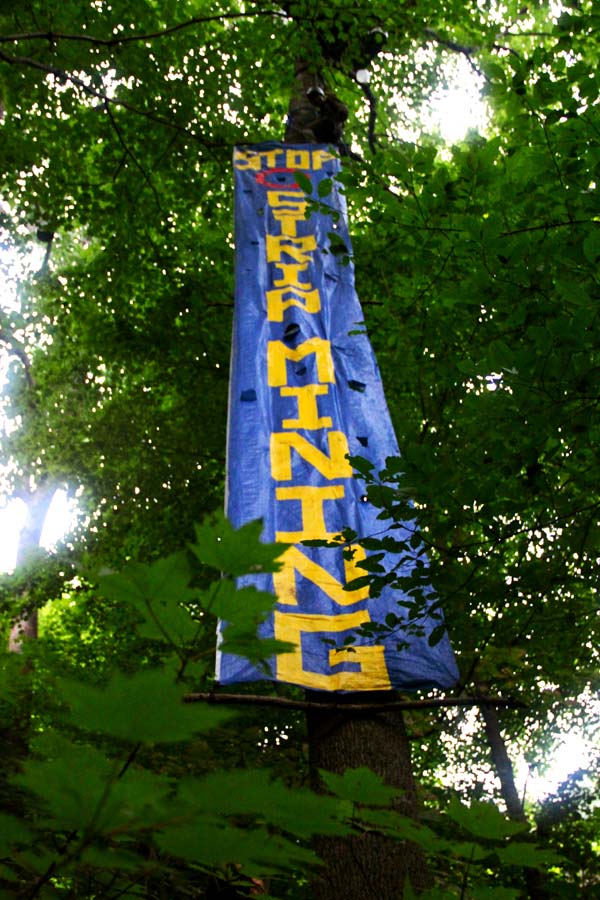Tree-Sit Halting Blasting on Coal River Mountain Enters Eighth Day
Tree-Sit Halting Blasting on Coal River Mountain Enters Eighth Day

Marfork, W.Va. – Catherine-Ann MacDougal and Becks Kolins, two protesters associated with the RAMPS Campaign, continue to occupy trees on the Bee Tree surface mine, where they have been stopping work on the mine site since last Wednesday. Their direct supporters, Elias Schewel and Junior Walk, were arrested on the site on the first day of the tree-sit, charged with trespassing and released on bail of $1000 each that evening.
The RAMPS Campaign is calling for an end to strip mining in the Coal River watershed because of the devastating cumulative effects of mining on drinking water, residents’ health, cultural resources, and air quality. The tree sitters issued an open letter to Alpha Natural Resources yesterday, demanding an end to strip mining on Coal River Mountain.
Junior Walk, a lifelong resident of the Coal River Valley, recalls childhood hiking and hunting grounds and entire towns that have been destroyed by mining. Packsville, W.Va., the hometown of the late anti-strip-mining activist Judy Bonds, is one such town; residents were driven out by the increasingly severe impacts of mining on their water supply, air, and quality of life. (1) “We’re all standing in solidarity with the forgotten town of Packsville – now only remembered as Marfork, where we’re not allowed to go anymore, as well as every other town and every other person the coal company has murdered,” said Walk, referring to the documented connections between mountaintop removal mining and serious health concerns, including elevated cancer rates and birth defects. (2)
Despite the concerns of local citizens and organizations like the RAMPS Campaign, plans to strip mine more of Coal River Mountain continue to move through the regulatory process. Last week, the West Virginia Department of Environmental Protection issued notice of a public hearing on the Collins Fork Remediation Project, a proposed strip mine on the eastern side of Coal River Mountain. Like the Bee Tree permit where the sitters are located, much of the strip mining on the Collins Fork permit could be done without valley fills, by instead disposing of mining rubble in old impoundments and former high wall mines. Schewel, a Masters of Urban Planning graduate student, said, “I am here to study how federal laws that manage public water supplies are implemented here. They are not.”
For Schewel, this underscores the weakness of the new Environmental Protection Agency guidance on valley fill permits (3) in failing to protect communities from the destructive impacts of strip mining. “We are in a time and place where state agencies like the DEP are too corrupt or too incompetent to do their jobs, and federal agencies like the EPA and the OSM are too incompetent or too underfunded to do theirs,” said Schewel. “Direct action is necessary to protect the heritage, health and environment of areas threatened by strip mining.”
The tree sitters have weathered thunderstorms and severe heat and have succeeded in halting all work on the portion of the Bee Tree strip mine within Bee Tree hollow. Little work continued on other parts of the site, and only one small blast was set off this week – on Friday afternoon. The sitters were not harmed by the blast, and the RAMPS Campaign is monitoring the situation to ensure that the safety of the sitters is maintained.
Some local residents have voiced their strong support for the tree-sit and opposition to strip mining on Coal River Mountain. “I am one hundred percent behind the young people that’s come here to fight mountaintop removal,” said Sharon Thompson, a lifelong resident of Coal River Mountain and sister-in-law of the late Judy Bonds, in whose memory the tree-sit was organized. “I am so glad they are doing this in Judy’s memory and continuing the work that she started.”
RAMPS (Radical Action for Mountain People’s Survival) is a non-violent direct action campaign based in southern West Virginia dedicated to ending all forms of strip-mining in Appalachia. Ongoing updates about this action are available at www.rampscampaign.org.
(1) Map of the destroyed town of Packsville, W.Va.
(2) M. Ahern, M. Hendryx, J. Conley, E. Fedorko, A. Ducatman, and K. Zullig, “The association between mountaintop mining and birth defects among live births in central Appalachia, 1996-2003” Environmental Research in press, 2011. And N.P. Hitt and M. Hendryx, “Ecological Integrity of Streams Related to Human Cancer Mortality Rates,” EcoHealth 7 (2010): 91-104
(3) EPA Guidance

